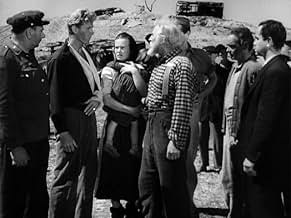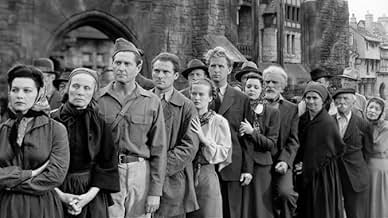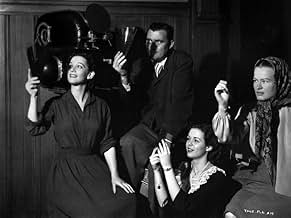Füge eine Handlung in deiner Sprache hinzuIn the dying days of World War II a German agent infiltrates a recently liberated Belgian town. His aim is to turn them against their Allied liberators.In the dying days of World War II a German agent infiltrates a recently liberated Belgian town. His aim is to turn them against their Allied liberators.In the dying days of World War II a German agent infiltrates a recently liberated Belgian town. His aim is to turn them against their Allied liberators.
- Auszeichnungen
- 1 wins total
Helen Beverley
- Mrs. Martha Varin
- (as Helen Beverly)
Richard Aherne
- Sergeant Patrick O'Farrell
- (as Richard Nugent)
Ludwig Donath
- Schmidt
- (as Louis Donath)
Gigi Perreau
- Baby
- (as Ghislaine Perreau)
Axel Anderson
- Nazi Officer
- (Nicht genannt)
George Blagoi
- Nazi Officer
- (Nicht genannt)
Sammy Blum
- Alex
- (Nicht genannt)
Empfohlene Bewertungen
Set in the near future following Germany's surrender - which probably qualifies it as science fiction - 'The Master Race' was made when being anti-Nazi wasn't yet deemed to be unAmerican and it was still believed that former Nazis were just waiting their chance to stage a comeback.
Representing a key credit for director Herbert J. Biberman, later to be blacklisted as one of the Hollywood Ten - Philip Dorn's portrayal of a noble Russian probably didn't help - and hailing from the days when George Coulouris was playing Nazis in Hollywood, 'The Master Race' contains an early expression of the belief that later became a Marxist commonplace that social forces not individuals decided political outcomes and that Hitler was just the puppet of vested financial interests; made overt by the opening scene when Coulouris glances at a portrait of his erstwhile Fuhrer and says "In defeat he has no value. They can have him...!"
Representing a key credit for director Herbert J. Biberman, later to be blacklisted as one of the Hollywood Ten - Philip Dorn's portrayal of a noble Russian probably didn't help - and hailing from the days when George Coulouris was playing Nazis in Hollywood, 'The Master Race' contains an early expression of the belief that later became a Marxist commonplace that social forces not individuals decided political outcomes and that Hitler was just the puppet of vested financial interests; made overt by the opening scene when Coulouris glances at a portrait of his erstwhile Fuhrer and says "In defeat he has no value. They can have him...!"
This is an important example of how film can be used for political and social propaganda, as well as a splendid example of an anti-fascist movie. It's not a great film and it makes no efforts to hide its political leanings - there's nothing subtle at all about the message it is delivering, the message that fascists aren't completed defeated and continue to undermine peace-building and social cohesion. I think that, any time before 2016, I would have found the film cartoonish and silly and melodramatic to the point of ridicule. But post November 2016, I look at the film so incredibly differently, as a film that, in fact, warns quite appropriately about extremism, about devaluing those different from ourselves... this film is important.
George Coulouris is nazi Colonel von Beck, near the end of WW II. as a high official, he is sent off to hide in Belgium, hopefully to re-ignite the nazi mission again, by turning the liberated town folk against the americans, and each other. it's even more interesting that this was made in 1944, while the war was still going on! co-stars thirty year old Lloyd Bridges, as Frank Bartoc, and Nancy Gates as Nina. Pretty good film! von Beck tries to stir up mistrust, some of the locals seem to go along with him. some religion. talk of hope. rebuilding. allegiance. faith in beliefs and trust. One of only five films directed by Biberman. he was caught up in the House Un-american Activities Committee actions, in the 1940s. he, his wife Gale Sondergaard, and many others were blocked from working in hollywood, as they refused to testify before the committee. This one is pretty good... could have been great, but I think because the war was still going on, a lot of it is "propaganda" acting, to give hope to those back home, and to prove to the audience that we were on the side of right.
This film unfortunately is a corny and inferior one, which is a terrible shame, because the subject deserved an excellent treatment. The subject is the fate of Nazism at the end of World War II. From 1944, Nazism began a process of planned 'metastasis', a word which I take from oncology to compare its spread to that of cancer cells when the central tumor is abandoned as the main base of the disease and the cancerous cells spread throughout the body. This is shown in this prescient early film, at the beginning of the story, where officers of the Wehrmacht are given sealed instructions and false identities to spread themselves throughout the world and work in secret for the restitution of Nazi ideals in the future. George Coulouris plays the wicked Colonel von Beck who presides over this, and is the villain of the film. It was not the Wehrmacht officers who did this in reality, but the SS. And the process was set up and presided over by Heinrich Himmler and Martin Bormann. Some conspiracy theorists suggest that Bormann got away and that his 'skull' which was found was not really his. We do not need to concern ourselves with that issue here. When the Allies got to Berlin they found the Berlin Treasury empty. All the gold of conquered Europe had been stored there. It was never found. Its value today would be trillions of dollars. The ingots had apparently been hidden in poisonous chemical tanks of the chemical company I. G. Farben (the main foreign 'front' for the Gestapo throughout the 1930s and the War), since gold cannot be damaged by any chemicals, and only the unstable mixture of two separate acids known as aqua regia can dissolve it. The gold was shipped out to safe havens like Sweden, Chile, and Argentina, over a period of time. Nobody opens poisonous chemical tanks to inspect what might be at the bottom. Apparently, ten percent of the gold was meant to be permanently stored as a 'backup' and still is stored. The rest has over the decades been used by the metastasized Nazis to buy international corporations and banks and attempt to achieve economic dominance and power, with a collection of bribed 'tame politicians' to assist them along the way. Many of their collaborators do not even know that they are working for metastasized Nazis, because all the collaborators care about is the money. The new Nazi Internationalists threw the Hitler cult overboard, just as shown in this film. The film was written and directed by Herbert J. Biberman, an inferior writer and director in Hollywood who had been a member of the Communist-leaning theatrical group in New York known as 'the Group'. He was later blacklisted during the McCarthy Era. It appears that he was a member of the Communist Party. Certainly, the corny creation of a hero of the Soviets as a character in this film is the kind of nonsense one expects of political hacks when they get too carried away making movies, and cannot resist inserting some propaganda into a film which then makes the story partially absurd. I mention all of this because it appears that Biberman was given some accurate information about what the SS were up to in their programme of 'Planned Metastasis', and I believe it must have come to him from the Soviet agents by way of Party contacts. How else could he possibly have concocted this story so early on, as even today people are still figuring out what really happened? Therefore, Biberman was performing a genuine service by informing the public of the process at this early date. But he did so with such lack of skill and talent, and with such adolescent propagandistic fervour, that the film has made no lasting impact, and its message was lost. The unlikely spot of Kolar, Belgium, is chosen as the supposed location of all the action, if you can call it action. The film contains a fine performance by the Danish actress Osa Massen as a German woman who has been raped by German soldiers and borne a child who has no name because of the shame. Lloyd Bridges plays her husband who returns and struggles to come to terms with the situation, but his performance is mediocre, as there is not much in the script and even less in the direction to give him much to do other than to wrinkle his brow and look earnest from time to time. This film could and should have been an impressive one, but it is not. Someone should try this theme again, and make it work this time.
Interesting and original central plot, more than negated by over-the-top propaganda and preachiness.
1944 and the Allies are pushing the Germans back on all fronts. In a last-ditch attempt to prolong the Third Reich and impose their will upon the world, the Nazis come up with a diabolical plan. Agents are sent to soon-to-be-liberated towns with the intention of blending in with the local population and turning them against the Allied liberators. One such agent is Colonel Frederick Von Beck. His aim is to sow seeds of distrust and revolution among the inhabitants of a small Belgian town.
Very original central plot, giving the movie heaps of potential. However, unfortunately, the year of release gives away how things develop from there. Being made during WW2 meant this was going to be a propaganda film. This doesn't have to be the death knell for a film - it is possible to make a propaganda film that remains watchable decades after the war has ended.
Unfortunately, this is not an example of such a movie. Incredibly one-dimensional and heavy-handed in its propaganda, there is no subtlety here. The Germans are evil to the nth degree. Even the Russians are portrayed as angels - anything for the war effort. Quite over-the-top in the extremeness of the propaganda.
This isn't the worst of it. A stark black-and-white good vs evil film could still have been entertaining. However, there's really not much action. Instead, we have speeches upon speeches, none of which say anything new or edifying - it's all stuff we already know: the Nazis are bad, fascism is bad, people need to be free, etc. Yet, every chance is grabbed to jam in a speech. What should have been one line in a dialogue turns into a several-minute monologue.
It's all so tedious and preachy.
Very original central plot, giving the movie heaps of potential. However, unfortunately, the year of release gives away how things develop from there. Being made during WW2 meant this was going to be a propaganda film. This doesn't have to be the death knell for a film - it is possible to make a propaganda film that remains watchable decades after the war has ended.
Unfortunately, this is not an example of such a movie. Incredibly one-dimensional and heavy-handed in its propaganda, there is no subtlety here. The Germans are evil to the nth degree. Even the Russians are portrayed as angels - anything for the war effort. Quite over-the-top in the extremeness of the propaganda.
This isn't the worst of it. A stark black-and-white good vs evil film could still have been entertaining. However, there's really not much action. Instead, we have speeches upon speeches, none of which say anything new or edifying - it's all stuff we already know: the Nazis are bad, fascism is bad, people need to be free, etc. Yet, every chance is grabbed to jam in a speech. What should have been one line in a dialogue turns into a several-minute monologue.
It's all so tedious and preachy.
Wusstest du schon
- Wissenswertes"Lux Radio Theater" broadcast a 60 minute radio adaptation of the movie on Januray 15, 1945 with George Coulouris and Helen Beverley reprising their film roles.
- PatzerThe British officer Captain William Forsythe gives a palm down American style salute.
- Zitate
Senior Lt. Andrei Krestov: I'm a doctor. or I was. and I can play the mouth fork.
Major Phil Carson: I was afraid of that.
- VerbindungenFeatured in Hollywood the Golden Years: The RKO Story: Dark Victory (1987)
Top-Auswahl
Melde dich zum Bewerten an und greife auf die Watchlist für personalisierte Empfehlungen zu.
Details
- Erscheinungsdatum
- Herkunftsland
- Sprache
- Auch bekannt als
- La raça suprema
- Drehorte
- Produktionsfirma
- Weitere beteiligte Unternehmen bei IMDbPro anzeigen
- Laufzeit
- 1 Std. 35 Min.(95 min)
- Farbe
- Seitenverhältnis
- 1.37 : 1
Zu dieser Seite beitragen
Bearbeitung vorschlagen oder fehlenden Inhalt hinzufügen

































